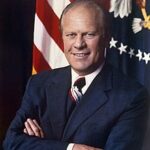The Historic Decision
President Gerald Ford signed the Helsinki Accords on August 1, 1975, in Finland’s capital. This landmark agreement involved 35 nations from Europe and North America. The Helsinki Accords established three main principles for international cooperation. These included respect for human rights, territorial integrity, and peaceful coexistence. 📊 The agreement represented the largest diplomatic gathering since World War II ended.
Strategic Diplomatic Framework
Ford faced significant domestic criticism for participating in these negotiations. Many Americans viewed the accords as legitimizing Soviet control over Eastern Europe. However, Ford understood the long-term strategic benefits of diplomatic engagement. The Helsinki Accords created binding international standards for human rights. ⚠️ Critics failed to recognize how these principles would later challenge authoritarian regimes.
International Cooperation Principles
The accords established three main “baskets” of cooperation agreements. Basket One addressed security and territorial issues in Europe. Basket Two focused on economic cooperation and technological exchange. Basket Three emphasized human rights and cultural exchanges between nations. These frameworks provided structure for ongoing East-West dialogue during tensions.
Impact:
Human Rights Revolution
The Helsinki Accords created unprecedented accountability for human rights violations worldwide. Eastern European dissidents used these agreements to challenge communist governments legally. 🌍 The accords provided international legitimacy for human rights movements across Europe. Organizations like Charter 77 in Czechoslovakia directly cited Helsinki principles. These groups eventually contributed to the peaceful revolutions of 1989.
Cold War Transformation
Ford’s diplomatic achievement fundamentally changed Cold War dynamics between superpowers. The accords reduced military tensions while increasing cultural and economic exchanges. Regular follow-up conferences monitored compliance with human rights commitments. 📉 Soviet violations became increasingly difficult to hide from international scrutiny. This transparency gradually weakened authoritarian control over Eastern European populations.
Long-term Democratic Impact
The Helsinki Accords provided crucial groundwork for ending the Cold War peacefully. Human rights provisions empowered civil society movements throughout the Soviet bloc. These agreements demonstrated that diplomacy could achieve more than military confrontation. 🔥 The accords proved that patient diplomatic engagement could transform international relations. Historians widely credit Ford’s decision as essential preparation for eventual democratization.
